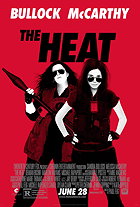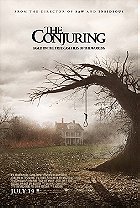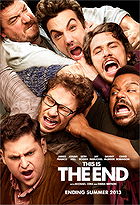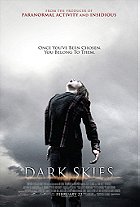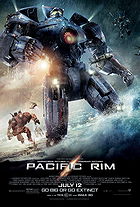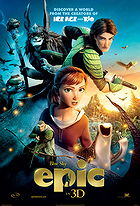In the interim since Hot Fuzz in 2007, Edgar Wright, Simon Pegg and Nick Frost have moved onto bigger things: Wright dabbled in Hollywood moviemaking with Scott Pilgrim vs. the World, while Pegg and Frost starred in Paul, as well as a host of other American projects. It's exciting to see the guys reuniting six years on, getting back to their British roots to put their own trademark spin on the science fiction genre with 2013's The World's End. The third instalment in the trio's Three Flavours Cornetto trilogy, the flick further demonstrates the superb spoofing instincts of writers Wright and Pegg, who employ their extensive knowledge of cinema to pay homage to genre classics while still creating a mightily entertaining and original classic of their own. The World's End is a different type of endeavour for the lads, but it's no less satisfying than Shaun of the Dead or Hot Fuzz, closing the trilogy with heart, plenty of rambunctious mischief, and a few nice pints of beer.

In the early 1990s, five schoolboy friends led by fearless rebel Gary King (Simon Pegg) set out to conquer "The Golden Mile" - that is, a pub crawl involving twelve taverns that concludes at The World's End. Alas, the boyhood chums fall short of the final pub, which haunts Gary into his adult life. Now in his forties, Gary has hit rock bottom. To pull himself out of the doldrums, he hatches a plan to reunite with his former pals and attempt The Golden Mile once again. Tracking down family man Peter (Eddie Marsan), divorced contractor Steven (Paddy Considine), stuffy real estate agent Oliver (Martin Freeman) and corporate lawyer Andy (Nick Frost), Gary leads them back to their old stomping grounds in Newton Haven, where the drinking soon commences and the gang are joined by Oliver's sister Sam (Rosamund Puke). However, it quickly becomes clear that things have changed, as nobody seems to remember them, and the people act strangely. Discovering that something quite sinister could be happening, the pub crawl nevertheless remains a goal at the forefront of Gary's mind, who's determined to reach The World's End no matter the cost.
Compared to other 2013 comedies like This is the End, The World's End is not one of the funniest movies you will see this year. However, it is one of the most satisfying because it supplements its flat-out fun disposition with genuine creativity. Similar to Hot Fuzz, Wright and Pegg take a deceptively simple premise and run with it; the big picture is a lot bigger than initially anticipated, resulting in several twists and turns that lead the story in unexpected directions. By the time we reach the story's dénouement, we're much further from the pub crawl conceit than we could have ever imagined. Added to this, The World's End is arguably the most poignant addition to the Blood and Ice Cream Trilogy. Wright aims for depth and heart, with the relationship between Gary and Andy instilling the narrative with a solid emotional centre and allowing for a shrewd examination of friendship and growing up. The World's End is pure class, assembled by a creative team who care about their craft. It's an utter treat to see such an altogether unique comedy emerge from this cinematic climate dominated by remakes, reboots and sequels.

The World's End is not on the same level as Shaun or Hot Fuzz in terms of laughs, which may be disappointing for some. To be sure, a funnier screenplay could've catapulted the picture into the stratosphere, but Wright's directorial approach compensates for this. You see, as opposed to other modern "comedies" like Movie 43 and Scary Movie 5, The World's End does not live and die by its comedy. Wright is not perpetually on the prowl for another laugh; he never loses sight of the importance of storytelling, tension, or effective mise-en-scène. The World's End is not always hilarious, but it's never boring, and that's a huge compliment for a comedy. Even if you don't laugh much, you'll still enjoy the story.
Of course, The World's End contains callbacks to the earlier collaborations of Wright, Pegg and Frost; it would not be a constituent of the Blood and Ice Cream Trilogy without a Cornetto, and there are surprise cameos here from some of the Spaced gang. The movie is also filled with nods to genre classics, including Village of the Damned and Invasion of the Body Snatchers, in addition to more obscure titles. However, Wright's style, voice and energy as a filmmaker ensure that The World's End transcends homage to become its own entity. Wright is an adamant film connoisseur, as well, shooting on 35mm film as opposed to the cheaper digital alternative. Consequently, The World's End looks beautiful. The film-like appearance enhances the sense of atmosphere, and the cinematography by Bill Pope is far more skilful than we had any right to expect on a project like this. Pope is actually an award-winning cinematographer who also lensed The Matrix and Spider-Man 2, and his immense talents are a tremendous asset. Furthermore, Wright continues to display his knack for great action scenes here, orchestrating a number of brawls that are thrilling and amusing in equal measure.

Admirably, Pegg and Frost do not rely on their usual comic shtick here, instead playing characters with more nuance. Pegg does play a fairly standard character type, but there are deeper aspects to the role that gradually emerge as the story progresses, and the manic energy that Pegg brings to the table is truly marvellous. After all, Gary grows more and more intoxicated as the story goes on, and Pegg manages to maintain consistency. Frost, meanwhile, portrays something of a sad sack, which is wholly unexpected considering the scenery-chewing roles he's played in the past. Fortunately, he pulls it off with confidence, and this may open up a whole lot of new doors for the actor. As for the rest of the gang, Freeman, Considine and Marsan all place forth competent performances and provide solid support for Pegg and Frost.
As with Shaun of the Dead and Hot Fuzz, The World's End undoubtedly improves on repeat viewings when you know what to expect and can better absorb the nuances of the filmmaking and storytelling. Rather than an out-and-out comedy like its predecessors, this is more of a Brit sci-fi flick with a few laughs, and it definitely works in this sense, even though a wittier script and a few more jokes would not have gone astray. The World's End is definitely a suitable conclusion for the Cornetto Trilogy due to its unexpected climax and the word "end" in its title. However, I hope that this won't be the last time Wright, Pegg and Frost get together to make a movie...
8.6/10
 Login
Login
 Home
Home 183 Lists
183 Lists 1668 Reviews
1668 Reviews Collections
Collections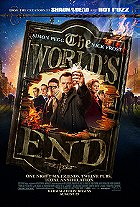
 0 comments,
0 comments, 







